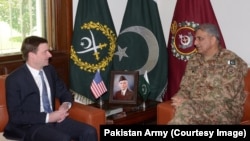Pakistan’s military chief reacted strongly Wednesday to President Donald Trump’s accusations that Islamabad takes billions of dollars in aid money from Washington and helps militants plotting deadly terrorist attacks against American troops in Afghanistan.
“We are not looking for any material or financial assistance from USA, but trust, understanding and acknowledgement of our contributions,” General Qamar Javed Bajwa told the U.S. ambassador in a meeting at Pakistan army’s headquarters in Rawalpindi.
While announcing his long-awaited Afghan policy, Trump harshly criticized Pakistan, asserting Washington is paying Islamabad “billions and billions of dollars”, but the South Asian nation is sheltering the terrorists U.S. forces are fighting on the other side of the border.
Bajwa in his meeting with Ambassador David Hale reiterated that peace in Afghanistan is as important for Pakistan as for any other country.
Collaboration
“We have done a lot towards that end and shall keep on doing our best, not to appease anyone, but in line with our national interest and national policy,” noted the Pakistani military chief.
The general underscored the need for “collaboration and synergy of effort” among stakeholders to successfully bring the long Afghan war to its logical conclusion.
U.S. and Afghan officials allege the Pakistani military’s spy agency is facilitating Taliban insurgents and militants of the dreaded Haqqani network to launch attacks in Afghanistan.
Hale said the United States values Pakistan’s role in the war against terrorism and seeks cooperation from Islamabad to resolve the Afghan issue, according to the army statement.
Pakistani security forces have uprooted all terrorist bases on their soil, including that of the Haqqani network, and have also shared evidence with top American military officials who visited Islamabad just days before Trump delivered his speech, officials insist.
“The [Pakistan] army chief made an offer to them that “you [U.S] pick up a point, you chose the time because you say there are training camps in Pakistan and let’s go and you would see it for yourself whether they are there,” Ghafoor told VOA.
The spokesman said the military has been working closely with American counterparts in fighting regional terrorism and is ready to work with the United States to address each other's "reservations" to carry forward the war.
Kashmir an issue
A separate statement from Pakistan’s Foreign Ministry said it is disappointing the U.S. president ignored “the enormous sacrifices” Pakistanis have made in fighting terrorism.
“No country in the world has suffered more than Pakistan from the scourge of terrorism, often perpetrated from outside our borders,” according to the ministry.
It did not name any country, but Islamabad consistently accuses rival India of using New Delhi’s growing influence, particularly in security institutions of Afghanistan to support and orchestrate terrorist attacks in Pakistan.
The ministry statement attempted to link Afghan stability to the resolution of Pakistan’s long-running Kashmir territorial dispute with India.
“The threat to peace and security cannot be isolated from the complex interplay of geopolitics, continued existence of festering disputes and pursuit of hegemonic policies. Non-resolution of the Jammu and Kashmir dispute remains the primary obstacle to peace and stability in the region,” it said.




